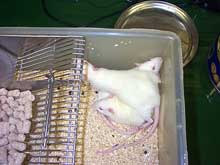Fluoxetine: antidepressant and a possible new drug for the treatment of obesity

Genetically fattened Zucker fa/fa rats <br>© University of the Basque Country
The Department of Nutrition and Bromatology of the Faculty of Pharmacy of Gasteiz, University of the Basque Country, is studying the action mechanism of fluoxetine in genetically fattened rats (Zucker fa/fa). Due to fluoxetine, those rats eat 50 % less. Therefore, the bodies put on less weight and the size of different fat tissues is reduced.
Antidepressants of the type of fluoxetine reduce appetite. More exactly, fluoxetine affects on neuropeptides that regulate appetite. Hence, it is believed that fluoxetine can be used to treat obesity.
After studying the action-mechanism of fluoxetine it has been observed that it reduces the quantity of Y neuropeptide. That peptide is orexigen, it causes appetite. The fluoxetine does hinders the trasport of that peptide, and so appetite is reduced.
That result has lead the scientists of the faculty of pharmacy to study the effect of fluoxetine on melanocortins. Melanocortins are important neuropeptides that control how many food is consumed. Now they are studying the changes that may occur in the operative system of melanocortins, both in MC4-R melanocortin receptors and in a-MSH (alfa melanocyte stimulating hormones) .
Hunger and neuropeptides
Appetite is a feeling that is created in the hypothalamus and its regulation is a complex process that depends on the regulation of neuropeptides, neurotransmitters and several hormones. In that process two types of neuropeptides must be taken into account: orexigens or appetite stimulants and anorexigens or reducers of appetite.
Some of the well-known orexigens are Y neuropeptide, some opioid peptides, endogenous cannabinoid, etc. Among anorexigens CRF (corticotropin releasing factor), CART (cocaine and amphetamine related transcript), melanocortin, galanin and cytokines. All those neuropeptides have effect on the hypothalamus and their interaction causes hunger and satiety.
It is believed that those neuropeptides could be the responsible of disorders such as obesity, anorexia nervosa and bulimia. Nowadays there is no appropriate drug to treat those disorders and some of the cures that have been used are very dangerous and harmful for the health, for example amphetamines. According to the result of this research, who knows if fluoxetine, apart from being an antidepressant, may become a secure drug to treat obesity.
Media Contact
All latest news from the category: Health and Medicine
This subject area encompasses research and studies in the field of human medicine.
Among the wide-ranging list of topics covered here are anesthesiology, anatomy, surgery, human genetics, hygiene and environmental medicine, internal medicine, neurology, pharmacology, physiology, urology and dental medicine.
Newest articles

You are What You Eat—Stanford Study Links Fiber to Anti-Cancer Gene Modulation
The Fiber Gap: A Growing Concern in American Diets Fiber is well known to be an important part of a healthy diet, yet less than 10% of Americans eat the minimum recommended…

Trust Your Gut—RNA-Protein Discovery for Better Immunity
HIRI researchers uncover control mechanisms of polysaccharide utilization in Bacteroides thetaiotaomicron. Researchers at the Helmholtz Institute for RNA-based Infection Research (HIRI) and the Julius-Maximilians-Universität (JMU) in Würzburg have identified a…

ASXL1 Mutation: The Hidden Trigger Behind Blood Cancers and Inflammation
Scientists show how a mutated gene harms red and white blood cells. LA JOLLA, CA—Scientists at La Jolla Institute for Immunology (LJI) have discovered how a mutated gene kicks off…



